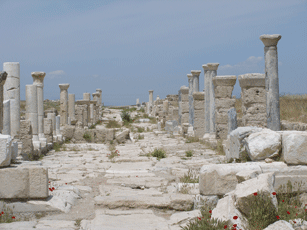COGaIC: Power to the People?

Main Street of Laodicea (A Term Signifying the Rule by the People)
In the latest edition of COGaIC’s Vision magazine, in an article titled Power to the People, Brian Orchard wrote:
Is more and better democracy the way of the future? Will the establishment of democratic forms of government end the strife in contentious regions such as the Middle East? Can the enforced implementation of democracy by the United Nations or the United States solve the world’s problems?…
Democracy is generally recognized as originating with the Greeks, when revolts in Athens brought to an end a dynasty of tyrants in the fourth and fifth centuries B.C.E. The term demokratia comes from kratos, “rule,” and demos, “people.” Hence the definition, “the rule of the people.” Aristotle thought that the ideal number of men participating in each democratic system would be about five thousand. No doubt the breadth of contemporary applications would surprise him. Today, the ancient philosopher’s concept of the polis (city) as the basis for democracy has given rise to national and even global models.
While there are many modern variations of democracy, all involve “the people” in processes that either express the will of the majority or act as checks and balances on a centralized authority…
For some, “the rule of the people” is the panacea for all problems relating to personal liberty, human rights and freedom in general. For others, it means globalization and its 24-7 partner, the Internet, which transcends political boundaries. In either case, views of democracy tend to be enhanced by the collapse of closed systems, under which the people’s desires have been subjugated by the will of the state…
Law plays an important part in democracy. The modern democratic state creates laws to protect the individual liberties of its citizens, as well as to protect citizens from injustices or abuses at the hand of those they elect. Since man took to himself the authority to decide right from wrong, the laws developed within the democratic state are made by man, based on what he decides is right or wrong. And we all know that there are many divergent views regarding moral and ethical values…
The law of God was designed to provide just such guardrails for human conduct. If we stay within them, our conduct will lead to the objectives sought by democracy. According to Moses, speaking to ancient Israel about that law, “the Lord commanded us to observe all these statutes, to fear the Lord our God, for our good always, that He might preserve us alive, as it is this day” (Deuteronomy 6:24). This is the law that provides moral and ethical content as a basis for daily living and protects human rights in the process. Instead of deciding for ourselves what is right or wrong, we need to seek a common basis for law from the One who created us in the first place. Then the individual liberty of the citizen would be protected and rulers would be required to put the good of the people above their own interests. The will of the people would be in harmony with the will of those entrusted to lead, each placing the needs and desires of others before his or her own. Peace and happiness would become a reality.
In biblical terms this system is known as the government of God. God’s benevolent government, based on His law, is the only kind that will successfully address the problems we see surrounding us today. Yes, this may be the democratic age, but it is not going to be the era when humanity solves its problems by its own systems of government, democratic or otherwise. King Solomon tried it all, and his summation, found in Ecclesiastes 12:13 (King James Version) is powerful: “Let us hear the conclusion of the whole matter: Fear God, and keep his commandments: for this is the whole duty of man.”
And it is true that democracy will not solve the world’s problems, but that the return of Jesus and the establishment of God’s government on earth will.
Several articles of possibly related interest may include:
Polycarp, Herbert W. Armstrong, and Roderick C. Meredith on Church Government What form of governance did the early church have? Which form of governance would one expect to have in the Philadelphia remnant? The people decide and/or committee forms, odd dictatorships, or the same type that the Philadelphia era itself had?
Should a Christian Vote? This article gives some of the Biblical rationale on this subject. This is a subject Christians need to understand.
The Gospel of the Kingdom of God was the Emphasis of Jesus and the Early Church Did you know that? Do you even know what the gospel of the kingdom is all about? True religion should be based upon the true gospel.
 |
Tweet |
|